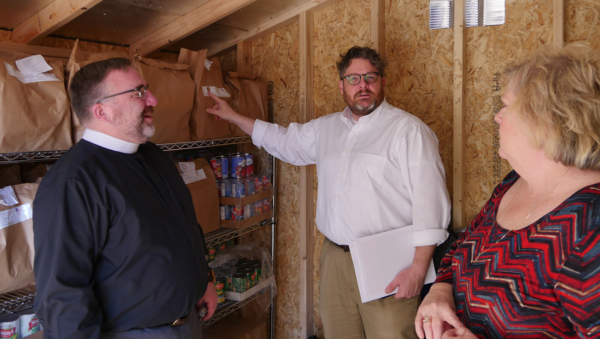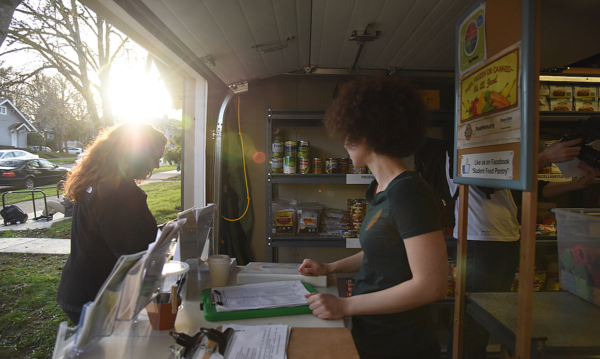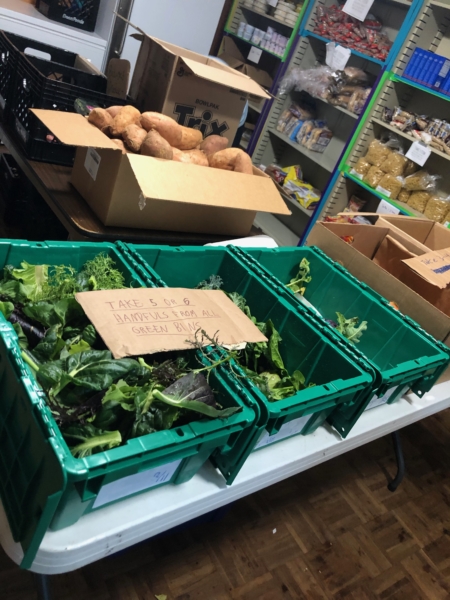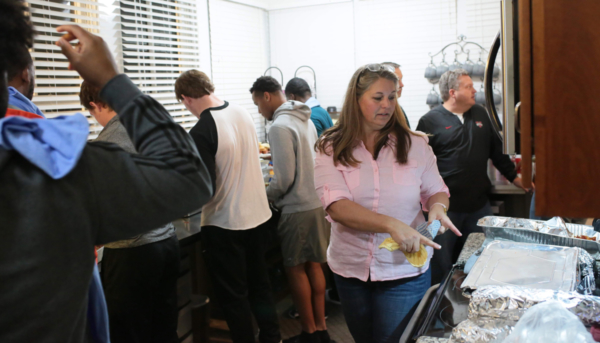Campus food ministries come in all serving sizesPosted Feb 19, 2019 |
|
[Episcopal News Service] Episcopalians across the church helped Episcopal News Service understand food insecurity on college campuses. Here are some of their stories.
St. Alban’s Episcopal Church’s UTA Food Pantry in Arlington, Texas

St. Alban’s Episcopal Church vestry member Doug Hunt, center, talks with the Rev. Kevin Johnson, left, and vestry colleague Pam Hardaway, right, about the arrangement of a new storage shed that holds nonperishable food for the parish’s ministry to international students. Photo: Mary Frances Schjonberg/Episcopal News Service
The budding food pantry at St. Alban’s Episcopal Church grew out of the parish’s desire to find ways to connect with University of Texas at Arlington, or UTA, two blocks away. “I don’t think we really knew what that was going to be,” said Doug Hunt, a St. Alban’s vestry member.
Pam Hardaway, another vestry member, said the parish’s previous ministry of offering lunch to UTA students was popular for a while as were some night activities, but then they seemed to wane.
Last May, the Rev. Kevin Johnson, St. Alban’s rector, and some parishioners talked with a representative of the university’s Student Affairs Office, and “the conversation quickly moved into food,” he said. The university has a large number of international students, mostly Hindu and Muslim. They have some other food-assistance options, but they weren’t as robust as they had been, according to Hunt.
“And they were being proselytized,” said Johnson, referring to feeding ministries of other Christian organizations.
“So, something clicked, and we said, maybe that’s our niche,” said Hunt.
They began to research how best to set up such a ministry. The pantry became a part of the 4Saints Food Pantry, a ministry of a group of Episcopal parishes in the Diocese of Fort Worth. It formed another partnership with Green’s Produce, a local farm market and garden center.
After scouting locations and contacting UTA’s International Student Organization, the group chose a location just off campus near an international student housing area. It is actually the parking lot of another church. The student organization suggested once-a-month distribution on a Saturday afternoon.
The pantry launched in November. The group had 50 bags of food, and 32 students came. December saw a drop to 18 students, a decline Hunt said could be attributed to the double whammy of finals week and a home football game. The pantry did not run in January because of semester break.
The effort has been evolving ever since. Johnson said recently that UTA’s Student Affairs Office asked that St. Alban’s move the pantry on campus to the Athletic Center, which gets a lot of foot traffic on Saturdays. The International Student Organization stepped up its publicity, and the Student Counseling and Psychological Services Office asked the church to provide food stocks for students whom they knew were experiencing food insecurity.
In two hours on Feb. 2, they gave away everything they had with them: 65 bags of food, plus fresh fruit and vegetables from Green’s Produce, 50 loaves of bread, and dozens of jars of spices and cans of coconut milk, among other things, said Johnson.
One young woman asked, “You mean you’re not going to make me pray with you first?” Johnson told her, “It’s just free food. No strings attached.” Then, he said, “a big smile appeared on her face.”
“The program is on a measurably positive trajectory,” Johnson said, and the parish is excited. “It really was one of those things where their needs lined up with our resources.”
Hardaway agreed, adding, “I think this is a calling that maybe we have not really been listening to for a while.”
Episcopal Campus Ministry’s Student Food Pantry in Eugene, Oregon
Like many such pantries, the Student Food Pantry less than a block from the University of Oregon campus partners with a local food bank, Food for Lane County. The pantry, which began in 2011, is part of the ministry of the Diocese of Oregon’s Episcopal Campus Ministry program. It also serves students from a community college, a private Christian university and a small alternative college, according to the Rev. Doug Hale, who has run the ministry since 2013.
Food for Lane County supplies most of the student pantry’s food. While Hale said the student pantry does not always control what it gets, coordinators try to make good choices. “From the very beginning, the pantry had some connection with the health center at the university and the dietician in particular, and so from the beginning, there was a concern about trying to not offer junk,” he said.
In the pantry, there is a shelf of canned produce, a grains section and in the center, “we try to have, if it’s available, as much fresh produce that we can offer in the space,” Hale said. The pantry has a refrigerator and a freezer so it can offer frozen meats and vegetables, plus yogurt from a local company.
“And it’s all crammed into this one single-car garage,” Hale said.
Last year, the pantry served about 100 people weekly. When they decided to go from one to two days a week, Wednesdays and Thursdays, “the number jumped immediately” to about 150, he said. Now, about 190 students a week come through, an increase Hale attributes to social media promotion and word of mouth.
People have to show that they are enrolled in one of the schools to use the pantry, and they can come once a week, which Hale said is more frequent than some other Eugene pantries allow. If students have children, that increases how much food they can take per visit.
The pantry’s relationship with the university has waxed and waned over the years, Hale said, and now is in good shape. The current administration is experimenting with a number of programs to fight food insecurity among students. It is also looking at whether it can lease for the pantry what Hale calls “a significantly larger space.” Increasing the pantry’s capacity might allow it to begin serving staff and faculty who also struggle with food insecurity issues, he said.
Asked what advice he might have for other Episcopal congregations and ministries in college towns, Hale suggested first connecting with local food banks. Then “take a look around at what is being offered,” either on campus or by other community organizations, and see where there might be a fit.
Houston Canterbury
Houston Canterbury spent the last academic year looking at who comes to a 20-year-old Wednesday community meal at the University of Houston run by the campus ministry association, what the Rev. Eileen O’Brien called the association’s “big feed model.” Monitoring student IDs and conducting some face-to-face interviews revealed that the ministry was largely reaching international students who were paying for their own education but struggled with living costs, as well as graduate students who did not have a meal plan and were on campus at the time of the Wednesday meal.
“We weren’t getting to those undergrad students who do actually struggle with food scarcity,” said O’Brien, who said undergraduates at commuter schools like the University of Houston are often the least connected to the campus.
O’Brien, who will soon begin a new job as rector of St. James Episcopal Church in Austin, Texas, said Houston Canterbury is trying to decide how better to serve the university community. The “big feed” will continue and, in fact, has expanded to include Thursday “Coffee in the Lobby” at its home base, the A.D. Bruce Religion Center.
FREE Lunch at the AD Bruce Religion Center today, 11:30-1. #UH #GoCoogs pic.twitter.com/GmWRKLIRAG
— Eileen O'Brien (@EileenEOBrien) January 16, 2019
Houston Canterbury is hoping to partner with campus organizations to find more ways to address the issue, including helping commuter students find services nearer to their homes. That next step will begin, she predicted, with conversations with the university’s student affairs office and the school’s Urban Experience Program and the Honors College.
The ministry also serves Texas Southern University, but O’Brien said the discussion about food insecurity is not as far along at the commuter campus that is right across the street from the University of Houston. “One of the questions that we were thinking about was, ‘If we established some sort of food bank program, could it not serve both campuses?’”
O’Brien said her time with Houston Canterbury made her “interested in how campus missionaries can do a better job of knowing the communities that our students come from and having good referrals within those communities” so that they can help commuter students find resources closer to their homes.
The interest came, she said, when the study showed her that the traditional ways campus ministries address hunger may not be the best ways to serve students. “I think that we’re naive if we get complacent with these sort of feeding programs and don’t step beyond them to address wider community health issues like food scarcity.”
Smokey’s Pantry at the University of Tennessee-Knoxville
At Tyson House, the Lutheran and Episcopal campus ministry at the University of Tennessee-Knoxville, or UTK, Smokey’s Pantry has been serving students every Tuesday during the academic year since January 2016. “We have a little bit of everything, from canned goods to fresh produce,” said Caitlynne Fox, Tyson House ministry coordinator and pantry intern.
Smokey’s has a partnership with a local community food bank. FISH Hospitality provides fresh produce, bread, meat, yogurt and hummus, “along with the traditional canned goods and pastas,” she said.
“Our main goal is to serve the UTK students, faculty and staff, but it’s open to anyone who wants to come in and get food,” said Rusty Graham, Tyson House administrator.
Between 60 and 80 families come each week, meaning 80 to 100 individuals get food from Smokey’s. There is no screening process for those who come to the pantry, and it was just this semester, Graham said, that they started asking if the individuals who came were students.
The pantry wanted to be able to know how many students it is serving, he said. The ministry collaborated with one of the offices at UTK that wanted to get more information about food insecurity on campus. “Ultimately, it’s going to help us know the impact that we’re having on campus. Those kinds of numbers will be great if we decide to pursue things like grant funding or just general reporting.”
Even though Tyson House is a denominationally supported ministry, Graham said Smokey’s Pantry is not operated as a faith-based program. “We want to limit any deterrent to guests coming in,” he said. “Eliminating those barriers to guests coming in can be tricky, so the fewer barriers…”
“The better,” Fox concluded.
Canterbury Bridge Episcopal Campus Ministry at San Jose State University in San Jose, California
As campus chaplain, the Rev. Kathleen Crowe, a Diocese of El Camino Real deacon at Canterbury Bridge Episcopal Campus Ministry at San Jose State University, was asked in 2014 to be part of a campus-wide committee to examine the issue of homelessness and food insecurity on the campus in San Jose, California. The committee found that a third of the nearly 33,000 students “had to decide, I am going to buy books, or I am going to eat,” in Crowe’s words.
The immediate response was to begin 15 portable food pantries across the campus in different departments that were stocked by those employees. “Often those shelves would be wiped out very quickly,” she said. Crowe would often talk to the students visiting the pantries, and she was able to give students “gold points” to use to buy meals in the school’s food court.
The 15 pantries were later consolidated into eight larger ones. “The vision had always been to have a permanent pantry on campus,” Crowe said. “And that dream was realized this semester.”
The university agreed to turn its old faculty dining room into such a pantry in partnership with Second Harvest Food Bank. There are perishable and nonperishable food items.
“Students are on their honor, but it is for students that earn less than $33,000 a year,” Crowe said, adding that guests have to prove they are enrolled and must bring reusable bags. The students swipe their ID cards so that the pantry can keep statistics.
The committee put money collection boxes in the food court, labeling them, “Help Feed a Spartan,” a reference to the school’s mascot. “Those little boxes are stuffed full all the time,” taking in $700 to $800 to go toward buying food for the pantry, she said.
Meanwhile, the teachers of fourth-graders at St. Andrew’s Episcopal School in nearby Saratoga asked if Crowe could help them develop a service project. She suggested they make personal hygiene kits. “Our students always need that kind of stuff,” she said.
Grace Café at Christ Episcopal Church in Valdosta, Georgia
What is now known as Grace Café at Christ Episcopal Church, across the street from Valdosta State University in Valdosta, Georgia, grew from one woman’s desire to help young people. Steph Johnson and her husband, the Rev. Dave Johnson, Christ Church’s rector, had always been involved somehow in youth ministry. When the congregation’s campus ministry got stalled in its early stages, she took on the job.
Her daughter was in nursing school, and Johnson told her to bring all her student friends to dinner at the rectory on Thursday nights. Then she told her son’s friends that they could continue to park for free at the church, “but they had to come and eat dinner with me on Thursday nights.” At the end of the first year, about 30 students were routine diners, and the group was outgrowing the rectory. So, Johnson asked the vestry if she could have a house on the church’s campus, and it agreed.
The downstairs is now Grace Café, whose slogan is, “It’s not cheap … it’s free.” Coffee, drinks and snack foods are always available, and when she can afford it, breakfast items. Students of all ethnicities and sexual orientations, homeless and with homes, come to the cafe for food, Johnson said. Some stay to study and meet up with friends.
About 400-500 people stop by every day, she said. And, about 130 students fill the ground floor of that house, the deck and a nearby building for Thursday dinner.
“I know I have kids who are living in their cars, but they won’t tell me that yet,” she said. “I make sure they have lots of food.” The cafe has a shelf of ready-to-eat food free for the taking.
The cafe offers a church service on Sunday mornings followed by lunch. The cafe is open from 8 a.m. to midnight.
Johnson used to do all the work herself, but now she has some helpers. Two other women help in the kitchen, along with two students who want to learn how to cook. Some parishioners bake desserts for Thursday night.
And then there are the interns. Four male students live rent-free above the cafe in exchange for 20 hours a week working at the cafe. When Johnson asked the vestry for another house on the church campus, the members agreed again. She renovated that building for five female students, who also intern at the cafe.
With more and more students coming to Grace Café and with a budding food pantry, costs were increasing, Johnson said. While some people suggested that Johnson could offer Thursday dinner for less money, she refused, saying she wants to treat the students like “honored guests.”
“I would want somebody to treat my kids that way,” she said, adding that she will only “cook things that I would want to eat myself.”
That has meant, recently, parmesan-crusted chicken, homemade fettuccine alfredo and roasted broccoli. “I also do a vegetarian option,” she said. “I haven’t quite gotten to the vegan thing yet.”
Dave Johnson, Christ Church’s rector, decided to ask parishioners to sponsor a meal at $350 a week. Those meals are now covered through this semester and the next. “Now I can take all that money I set aside for the Thursday dinners and put it into the cafe and the food bank,” Steph Johnson said.
“Basically, I have got a really, really super-supportive vestry that has yet to tell me no,” she said. “I don’t know if that’s because I am the priest’s wife or because they like what’s going on there.”
– The Rev. Mary Frances Schjonberg is the Episcopal News Service’s senior editor and reporter.





Social Menu